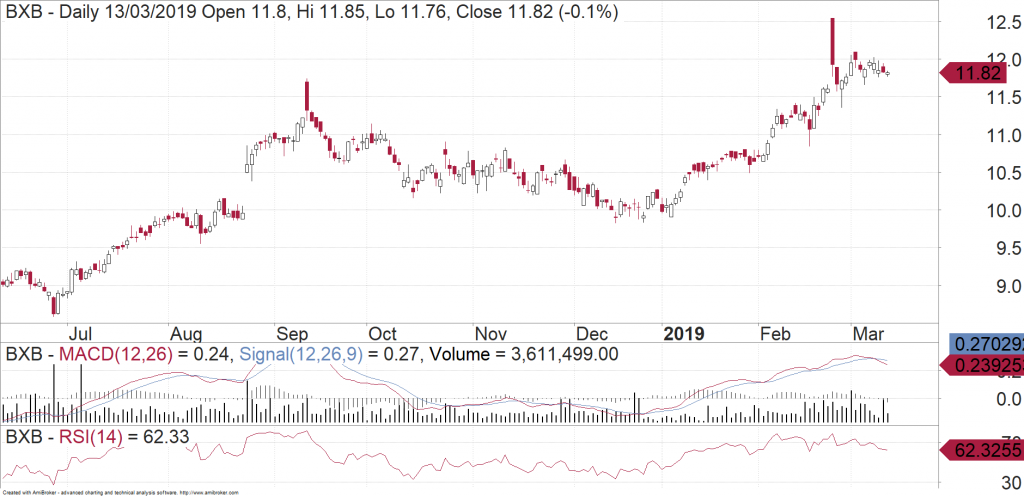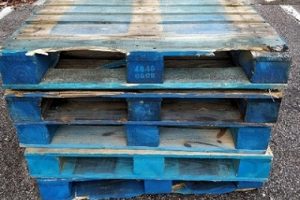The Brambles (ASX:BXB) share price has done well in the last year. However we have cause for concern and current levels may be as good is gets for now.
About Brambles
Brambles is the largest provider of pallet services. Following the announced sale of IFCO (a reusable plastic crates business) on 25 February 2019, which is expected to be finalised in 3Q19, the Company’s main operations will soon solely comprise the CHEP (pallets) division, which has operations in Americas (the main contributor to group revenue), Europe, Middle East & Africa (EMEA) and Asia. In the US, Europe and Australia, CHEP’s market share is estimated to be 55%, 25% and 70%, respectively.
Cost Pressures Continuing
We recently reviewed the fundamentals following the release of results for the six months to 31 December 2018 (1H19). The key takeaway from the result was that while BXB generated strong revenue growth, with all segments reporting higher prices and volume momentum, cost inflation continues to weigh on earnings. Cost pressures were most evident in the US pallets business. This was in the form of continued cost inflation, increased cost-to-serve, network inefficiencies and increased repair costs. In context, the US pallets business accounts for around three-quarters of the CHEP Americas division’s sales.
Importantly, the acceleration in input cost inflation during 1H19 weighed more heavily on margins than the market had expected. While the Company is able to implement pricing initiatives including surcharges and indexation to improve cost inflation recovery, the recovery of higher costs takes time. Although cost inflation measures in the US have started moderating, any material benefit to the Company unlikely to materialise until early FY20 (as lower spot rates filter through into contract rates). This is likely a later timeframe that some in the market had expected.
Further, input cost pressure is not just an issue for the US pallets business. CHEP EMEA reported a decline in underlying EBIT margins of 71 basis points in 1H19 due to higher cost inflation. Cost recovery in the CHEP EMEA business is lagged given indexation occurs annually on the roll-over of the financial year (1st July).
Asset Sale Realises Value; But Free Cashflow Concerns Remain
Shortly after the release of its interim results, BXB announced the sale of its reusable plastic container business, IFCO, with the net proceeds from the sale (US$2.36b) to be used to implement a share buyback (US$1.65b) and pay a pro-rata cash return to shareholders of US$300m (equivalent to A$29 per share). The balance will be used to repay debt. While the sale of IFCO improves the gearing level, there are still market concerns about the deteriorating level of free cashflow, which in 1H19, was insufficient to cover the dividend payment
Fundamental View
The Company provided guidance for “modest improvement” in 2H19 constant currency underlying profit, in comparison to prior guidance for underlying profit to “improve”. While BXB did not quantify its guidance, underlying EBIT growth for FY19 is likely to be ~3-4%. It is worth noting that consensus estimates show a 1.5% decline in EBIT for FY19, with consensus estimates for FY20 and FY21 to show EBIT growth of 10%, respectively. This reflects the expectation that BXB continue to generate strong revenue growth to underpin earnings & margin growth as input cost pressures commensurately ease.
We consider that the share price currently reflects this potential upside, as well as the return of cash from the IFCO sale proceeds. Accordingly, we take a cautious view on BXB due to the following reasons:
i. With margin benefits from automation, productivity and pricing initiatives in US pallets not expected to become evident until FY20 at least, there is short-term revenue risk from Brexit. This is given that 10% of European pallet movements involve UK/EU cross-border flows.
ii. While pricing conditions in US pallets remain favourable at present, recent history suggests that this may not be sustainable over a 2-3 year period. This is given that competition from alternative products (i.e. whitewood pallets) and other players remains a threat. It was not that long ago (4Q17), where there was ~3% deflation, with no pricing growth at all in FY17. The significance here is that revenue growth from volume and net new business wins since FY15 has typically been +1% per annum, while net new business wins since FY17 have been +1-2%, which has slowed from 4% in FY16 as the Company’s leading market share has been maintained.
Charting View
Our prior charting comment on BXB was in mid November when it was trading at $10.79. We expected it to hit resistance near $11 and then move on towards $12. Recent price action now looks negative. Since selling off near $12.50, the shares have only been able to trade in the lower part of that daily range. We may see BXB ease back in the short term towards the $11 – $11.50 support zone. At that point we would have to reassess.

Michael Gable is managing director of Fairmont Equities.
Current share prices available here.
You can learn more about technical analysis in this article.
An 8-week FREE TRIAL to The Dynamic Investor can be found HERE.
Would you like us to call you when we have a great idea? Check out our services.
Disclaimer: The information in this article is general advice only. Read our full disclaimer HERE.
Like this article? Share it now on Facebook and Twitter!

